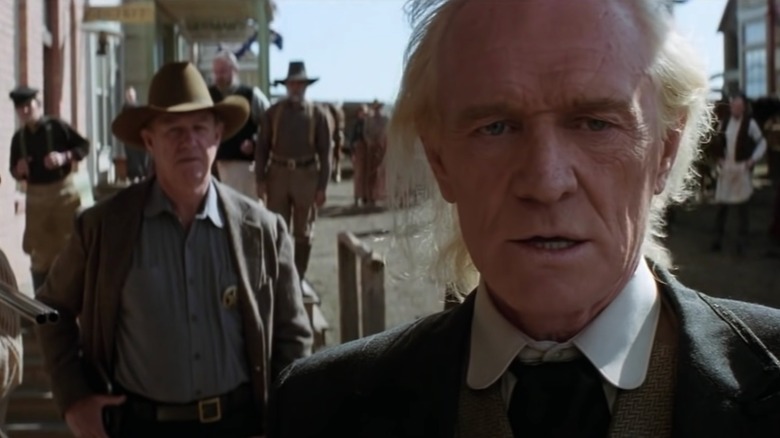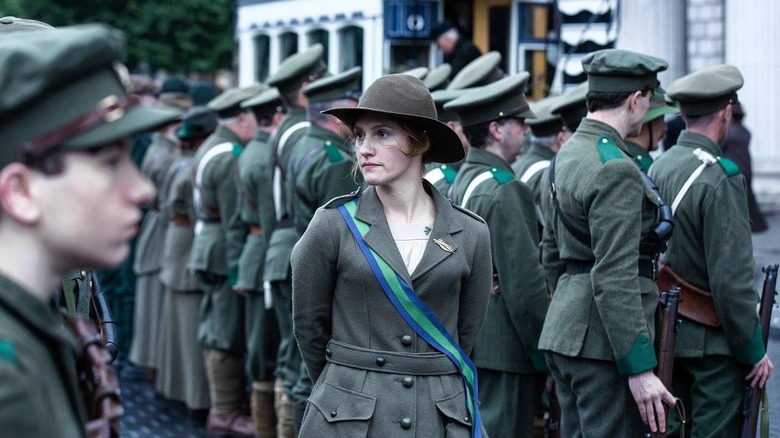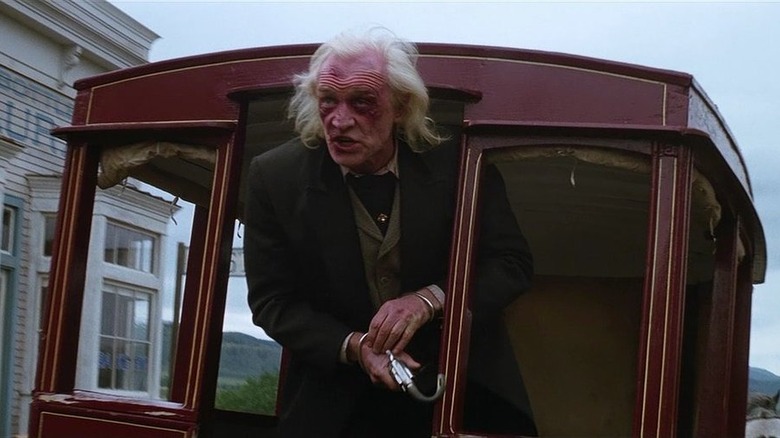Richard Harris Brought A Dark Chapter Of British History To His Unforgiven Performance
You might think that the late actor Richard Harris was an Englishman. He certainly had the accent and his roles ranged from King Arthur to Dumbledore. He also studied at the London Academy of Music and Dramatic Art and his sons Damian, Jared, and Jamie were all born in London. Despite all this, Harris wasn't British — he was Irish, born and raised in the city of Limerick.
One of Harris' earliest film roles was as an IRA soldier in the 1960 Robert Mitchum vehicle, "A Terrible Beauty." In 2020, The Irish Times posthumously listed Harris as the third greatest Irish actor of all time, behind only Daniel Day-Lewis (an England/Ireland dual citizen) and Maureen O'Hara.
Harris used his faux-Britishness when he starred in "Unforgiven" as arrogant, jingoistic gunslinger English Bob. Despite his moniker "The Duke of Death," Bob turns out to be a total fraud — it's even hinted that he's not actually English. When interviewed during the film's original run, Harris said he understood the character of English Bob because he understood, "that type of Englishman, because they festooned my nation, like for five or six hundred years."
Come Out, Ye Black and Tans
The Black and Tans (named for the colors of their uniforms) were recruited into the Royal Irish Constabulary. During 1920, the second year of the Irish War for Independence, the police were spread thin by their conflict with the IRA. The Black and Tans, recruited from the British population, were their reinforcements.
Harris cites the common belief among Irishmen that the Black and Tans were criminals, "People who were in jail for murder and rape, aggravated assault, they were given uniforms and sent to Ireland." However, this has since been disproven. In fact, the Black and Tans were mostly World War 1 veterans who had themselves unemployed at home. Whatever their origins, that doesn't change the brutality they inflicted once they were in those Black and Tan uniforms. They are most infamous for violent reprisals against civilians; if you militarize police and send them into a foreign land, they'll naturally see everyone there as the enemy. The Black and Tans did contribute to the war's end, but not by stomping the rebellion out; sentiment turned against the British so much that they had to come to the negotiating table.
British atrocities in Ireland go back much further — 800 years in fact. Harris mentions the colonization of Ireland, where, under royal directive, British and Scottish Protestants settled in the Irish region of Ulster and gifted confiscated land. It's because of this colonization that Ireland has an enduring Protestant population. Harris, who didn't have many kind thoughts on British expats, drew on this for his performance as English Bob.
An upper class fake
Harris felt that a man like Bob wouldn't be a real English aristocrat but a "spiv" with pretensions of blue blood. Since the character was destined for humiliation in the script, he suggested they add another layer:
"When I read the script I said to Clint, 'You know it'd be great if I could do this, it'd be great if I could play this man as a very sort of upper-class fake. At the end of the picture, when he gets the hell kicked out of him by Hackman, then maybe all of that drops and you really see that behind it all he's really sort of a low type, low-life guy.' So Clint said, 'Yes, great, go for it.' I got afraid of it sometimes shooting the picture, but he kept encouraging me to go for it, you know."
When we first meet English Bob, he doesn't even spare words talking about the assassination of President James Garfield ("Unforgiven" is set in 1881, the same year as Garfield's death). As Bob puts it, "If you were to try to assassinate a king, sir, the, how shall I say it, the aura of royalty would cause you to miss. But, a president — I mean, why not shoot a president?"
When he's disarmed, beaten, and sent out of town by Sheriff Little Bill Daggett (Gene Hackman), Bob curses the town of Big Whiskey. Every trace of poshness from his accent is gone, revealing his lower-class roots now that he's got nothing to hide.


